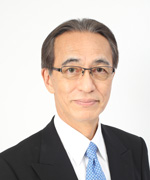- Japanese
- English
Message from the President

The 27th Annual Scientific Meeting of the Japanese Heart Failure Society
President: Michihiro Yoshimura
Professor, Division of Cardiology, Department of Internal Medicine
The Jikei University School of Medicine
Despite the continued prevalence of COVID-19, it seems that social activities are beginning to restart as we come to terms with the concept of “living with COVID.” This includes medical conferences, which are steadily resuming with infection control measures in place. Under these circumstances, the 27th Annual Scientific Meeting of the Japanese Heart Failure Society will be held over the three days from Friday, October 6 to Sunday, October 8, 2023 at PACIFICO Yokohama North. To give all participants the intrinsic benefits of an academic conference, we are currently progressing preparations to hold this meeting as an in-person event, with some sessions planned to be available afterward as video-on-demand programs.
Recent years have seen dizzying advances in heart failure medicine. Firstly, more and more new evidence for heart failure treatment drugs is being published. As a result, work on updating the Japanese, European, and American guidelines is getting underway. However, heart failure is a topic covered by a very broad variety of fields. This includes not just pharmaceuticals but also diagnostic imaging, biomarkers, various device treatments, genome medicine, telemedicine, artificial intelligence (AI), and big data, among others. Areas such as interdisciplinary team medicine, cardiac rehabilitation, and palliative care are also extremely important in heart failure management, and in each of these areas, active work is ongoing. In the study of heart failure, we thus have a mountain of topics to debate, and I intend to make this Annual Scientific Meeting an opportunity for wide-ranging discussions.
The study of heart disease has a long history, but it can be said to have entered a new era with the determination of the structure of atrial (A-type) natriuretic peptide (ANP) by Matsuo, Kangawa, and their colleagues in 1984. The discovery that hormones are secreted by the heart greatly changed our ideas about this organ. Over the past 30 years or so, the academic study of endocrine metabolism in the cardiovascular system seems suddenly to have bloomed. This is evidenced in drugs such as human ANP (hANP), angiotensin receptor-neprilysin inhibitors (ARNIs), and sodium/glucose cotransporter 2 inhibitors (SGLT2is).
I myself have been conducting research on ANP, brain (B-type) natriuretic peptide (BNP), and other hormones. This has made me aware of the importance of inter-organ networks, or to put it another way, the significance of managing heart disease from a whole-body perspective. The founding spirit of The Jikei University School of Medicine, to which I belong, is “Treat the patient, not the disease .” These words express the importance of looking squarely at a person suffering from a disease and treating that individual person, rather than simply treating diseased organs. Against this backdrop, the title of this Annual Scientific Meeting of the Japanese Heart Failure Society will be “Inter-organ networks in heart failure; the significance of whole-body observation.” To reach a deeper understanding of heart failure, it will be important to examine myocardial cells in detail on the molecular level, but I think it is also necessary to take a step back and observe the heart from a whole-body perspective. This is true both in terms of research and in everyday clinical settings. Many experienced medical professionals will be made intuitively aware of the exacerbation of heart failure by noticing some sort of general bodily change in the patient. What it is they see that leads to this judgement is, I think, a really interesting question, and I feel that important hints may be hidden there.
As I mentioned above, although COVID-19 is still with us, I sincerely hope to welcome you all to Yokohama in fall 2023. I look forward to as many JHFS members as possible gathering together to engage in wide-ranging and in-depth discussions of heart failure. It is my intention that this Annual Scientific Meeting will contribute to raising the level of research and everyday clinical practice among those who attend, and lead to even more active networking between Japanese and overseas colleagues.
© 2022 The 27th Annual Scientific Meeting of the Japanese Heart Failure Society

